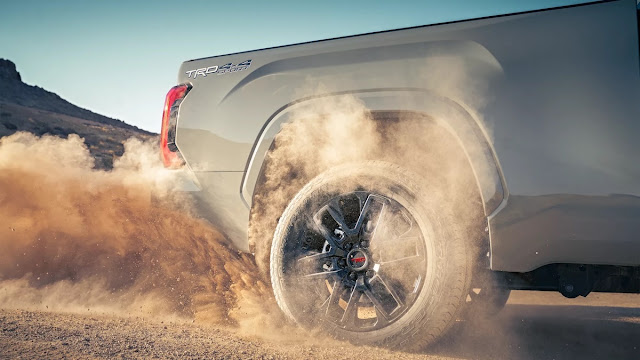Trying to figure out which features you need in your next new Toyota? We hear you - there's a lot to consider, especially when it comes to performance. Today our Toyota of N Charlotte experts are breaking down one of the most common questions we hear when it comes to performance features... what's the difference between all-wheel drive and four-wheel drive?
So here's the first thing you need to know - a lot of people incorrectly assume that all-wheel drive and four-wheel drive are the same thing, and that the terms can be used interchangeably. However, this is definitely not the case. Here's the breakdown of these two different features:
All-wheel drive (AWD) is when all four wheels power the vehicle - the engine is sending torque to all four tires at the same time.
Four-wheel drive (4WD) is when the front and rear driveshafts lock together to keep the front and rear axles turning at the same speed. This ensures that torque is sent to at least one front wheel and one rear wheel at all times, even if the terrain is uneven or rough.
The main differences between all-wheel drive and four-wheel drive
OK, so what are the differences between all-wheel drive and four-wheel drive? Here are some key takeaways to remember as you shop for your next N Charlotte Toyota.
- All-wheel drive is optimized for use on the pavement (not off-roading). It helps your car retain its traction and grip when you're driving on slippery surfaces, like roads covered in snow, ice, or rain. It also helps your N Charlotte Toyota to grip the road better when you're taking curves or turns at higher speeds.
- All-wheel drive is becoming more and more popular; you used to only see it on trucks and SUVs, but now you can find it on minivans like the N Charlotte Toyota Sienna and sedans like the Toyota Camry. The new Toyota Prius even offers this feature.
- Most vehicles turn all-wheel drive on and off seamlessly, switching back and forth from front-wheel drive (or rear-wheel drive) so you get the safety and traction you need while still being able to maximize fuel efficiency.
- Four-wheel drive, on the other hand, is best utilized OFF the pavement on dirt, rocks, gravel, mud, etc. We recommend that you do not attempt to use the four-wheel drive feature on a paved surface.
- This performance feature guarantees that when you're driving in challenging terrain that's rocky, icy, muddy, etc., you'll have at least one front wheel and one rear wheel giving you the traction you need at all times.
- Almost all four-wheel drive vehicles need to have the feature engaged manually - you'll need to press a button, flip a switch, or turn a knob to turn the feature on and off.
Should you go for all-wheel drive or four-wheel drive?
So which do you need on your next N Charlotte Toyota - all-wheel drive or four-wheel drive? Here are a few points to consider:
- If you spend most of your time in a typical commute on the pavement and want more peace of mind while driving in bad weather, then all-wheel drive is going to be your best bet. Tons of our new Toyotas in N Charlotte have this performance feature.
- If you like to take things off the pavement and explore uncharted terrain, then four-wheel drive is going to be your best bet. You'll find this feature on a ton of our N Charlotte Toyota trucks and SUVs, like the Toyota Tacoma and Toyota 4Runner.
Want more help or want to test drive a new Toyota with either of these performance features? Call Toyota of N Charlotte today! We're open seven days a week at (704) 875-9199 and we're conveniently located just off I-77 at exit 23 in Huntersville.

No comments:
Post a Comment